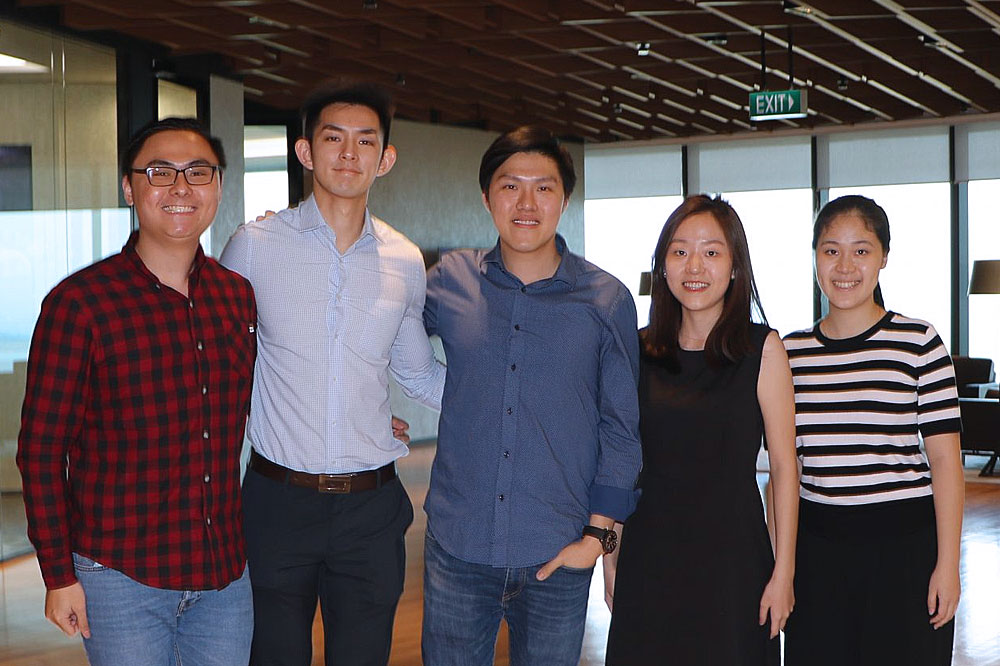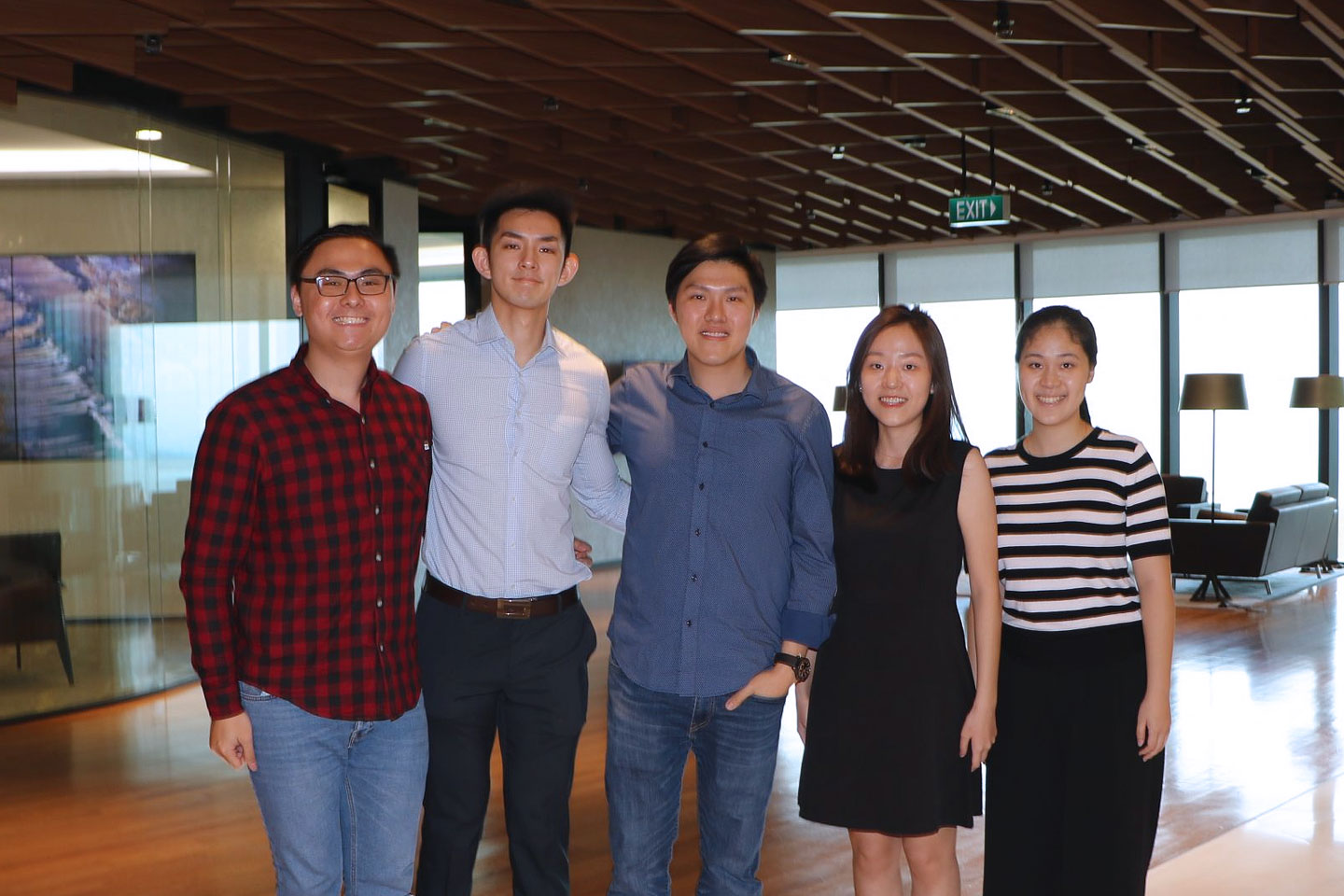As a NUS Business School student, Clarence was actively involved in the faculty’s Bizad Club as a management committee member. In his penultimate year, he helped lay the foundation for NUS BizConnect, a platform for undergrads to meet industry leaders and receive mentorship.
In his own words, Clarence is grateful for the many internship opportunities that he was fortunate to take on, including a 6-month stint with Lenovo in Beijing, a 2-month internship in the (Istana) President’s Office under His Excellency late-President S.R. Nathan, and as a research intern with a family office hedge fund, Kazim Asset Management.

Clarence Chan (centre), Vice President at MUFG Bank, Bachelor of Business Administration – Finance (2010), with the NUS Business School Alumni (NUSBSA) team
Upon graduation, Clarence secured an offer with DBS in the Management Associate Programme, where he chose the track of becoming a structured finance specialist in securitization. After his DBS role, Clarence joined Temasek as a member of its corporate finance and investor relations team. Now, he serves as Vice President in the Asian Investment Banking Division of MUFG Bank as a securitization specialist leading the East Asia regional business. He is also a Fintech enthusiast who dabbles in Python programming.
Clarence also holds a Master’s in Innovation and Entrepreneurship from HEC Paris.
Q: Could you share more about your role and yourself?
Currently, I am working at MUFG Bank. We have over 1,000 employees in Singapore, with a focus on commercial and corporate banking services. My current department is the Asian Investment Banking Division (or “AIBD”). My specialization is in securitization / asset-backed financing. In short, securitization is the act of pooling granular financial assets such as home mortgages, auto loans, etc from banks or finance companies and structuring these assets into bonds which are then sold to investors for funding. In MUFG, we structure the bonds and would either invest into or distribute these securitized bonds. The securitization team, which I am part of, focuses on 3 main markets in Asia – namely Australia, South Korea and China. I have been in MUFG for close to 4 years, with my first 2 years based in Tokyo. My main responsibility is to lead the team covering our East Asia business, namely China and Korea.
Q: Please share with us your experience as Vice President of MUFG and a short summary of a normal working day for you.
In the mornings, I usually start off with the more mundane tasks. As Seoul is an hour ahead of Singapore, our Korean clients will send us daily reports relating to securitized transactions MUFG is invested in. My role would be to scan these reports to assess for asset performance deterioration, if any. If there are live deals, we work with our clients and guide them through the deal management process to close the transaction. A typical securitization transaction usually takes 8 to 10 weeks to close – starting from receiving the mandate as arrangers, and up till the bonds are issued. Our work largely revolves around deciding the commercial terms, structuring the deal, keeping the rating agencies informed for bond ratings, working with lawyers to execute the transaction documents, and liaising with operations to ensure that the funds reach the issuer on the closing date. Sometimes, we travel to visit our clients for due diligence meetings together with the rating agencies.
Occasionally, I attend and speak at industry conferences as part of our branding and marketing efforts. I most recently spoke on a panel at a Hong Kong conference, to discuss about the securitization market in China, which is now the world’s second largest after the U.S.
Q: How did you accumulate various work experience or internships prior to your first formal job?
My first internship was with Lenovo in Beijing for 6 months. Back then, not many students were willing to delay their graduation for half a year and I got the job. I guess luck played a part.
During my undergrad second year, the financial crisis unfolded and it was quite hard to find an internship. I was fortunate to be nominated by NUS Business School for an 8-week internship opportunity at the Istana under President S.R. Nathan. The highlight of the internship was participating in a presidential state visit to Turkey together with our political and business leaders.
In my undergrad third year, I worked in a hedge fund / family office focused on investment research and analysis. I started on a part-time basis (while juggling my thesis) and extended the internship during the 3-month summer academic holiday break.
Q: What was the biggest factor you took into consideration when selecting your first career?
This is an interesting question! I did not consider much when I took on my first job. Just for background, I graduated after the 2007-09 financial crisis and the first offer on the table was the hedge fund I interned with. I could not imagine myself working in the fund because the team was small and the work repetitive. I decided to take the next offer – the DBS Management Associate Programme – which allowed me to broaden my networks and rotate across different roles for the next two years.
Q: What do you think are the key things students should look out for when selecting their first career?
Look out for jobs that will give you a good experience and do not focus too much on monetary rewards in the earlier phases of your career. Choose a role that gives you exposure and the chance to build your network.
Look out for new learning opportunities and chances to take up more responsibilities
Q: What are the risks or advantages that young alumni should look out for when making a career switch?
Look out for new learning opportunities and chances to take up more responsibilities. Those are strong positives for a job switch. The risk arises when you jump between jobs too early or when you are not ready. This goes back to my previous point – breakdown what you can potentially learn from the new role. If you think that the learning curve is good, make that switch. Do not consider job offers purely based on extrinsic rewards such as a slight pay raise.
Q: Having worked in both DBS Bank and MUFG, could you share with us about the main differences in the working experience between these two banks?
If we were to compare, DBS is becoming a regional powerhouse in Asia, while MUFG has international presence because of its U.S. and Asian subsidiary banks. In terms of work culture, I would say that Japanese banks are slightly more hierarchical. I have learned to work well with my Japanese colleagues because they bring a disciplined and prudent mindset to their work. Per my experience in DBS and MUFG, it helps to be open-minded to embrace different cultures.
Q: What advice do you have for undergraduate students who are interested in the banking industry?
If you were selected for a management associate programme, I would highly advise you to grab the opportunity. Banking has many tracks and it is better to learn what you like or dislike after trying it. Most programmes allow you to try different roles with each stint ranging from between 6 months to a year. In short, you can effectively “change jobs” several times without being branded as a job hopper. For my programme with DBS Bank, I rotated across the Treasury & Markets, Finance, and Human Resources departments. In fact, I truly enjoyed my rotation in Human Resources because I picked up a lot of soft skills and got to observe the organization from a different perspective.
Try out different industries when you are young
Q: What are some of the challenges you foresee in the industry?
Banking is getting more heavily regulated. Separately, with the advancement of technology, fewer people are needed for repetitive tasks that could potentially be automated. The largest job cuts would possibly come from the area of operations and the biggest challenges would likely come from being compliant with ever-tightening regulations. I think it is good when industries face fundamental changes, such as the introduction of blockchain technology in finance, it encourages a more efficient allocation of resources and more effective way of doing business. Another challenge would be the constant shortage of skill sets and talents in niche areas.
Q: Would you advise young alumni to stick into the same industry or try out different industries?
Try out different industries when you are young. It will not be a disadvantage if you can explain your career story during interviews. Showcase the skills you have picked up in different industries and how are they are transferable into the role that you are applying for. Take the opportunity to gain more exposure and experiences when you are young!
Q: What advice do you have for undergraduates?
Read a lot and meet a lot of people. Go beyond what you are required to learn from textbooks and lectures. I understand that many students focus on passing exams. However, if you really want to get into the banking industry, you need to understand the industry and some basic concepts, which you can pick up from reading or speaking to others. You need content and knowledge to form the basis for a meaningful conversation, especially for interviews.
The Alumni Spotlight Stories is a weekly series that explores a Bizad alumni’s journey from school to the working world. The story was first published in “Alumni Spotlight Stories: From Student Life to the Peak of your Career” compiled by the NUS Business School Alumni (NUSBSA).




